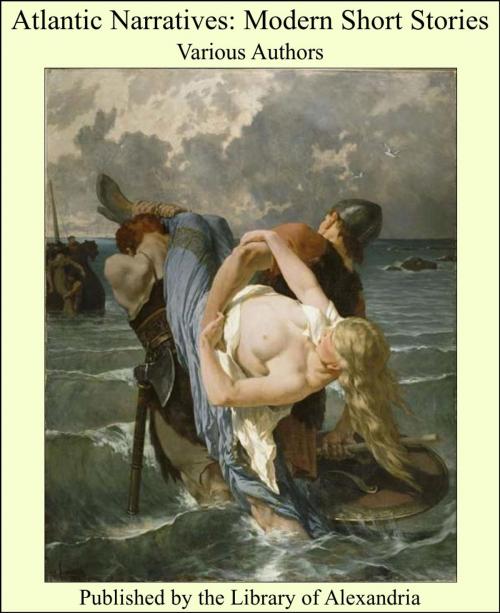Atlantic Narratives: Modern Short Stories
Nonfiction, Religion & Spirituality, New Age, History, Fiction & Literature| Author: | Various Authors | ISBN: | 9781465514585 |
| Publisher: | Library of Alexandria | Publication: | March 8, 2015 |
| Imprint: | Language: | English |
| Author: | Various Authors |
| ISBN: | 9781465514585 |
| Publisher: | Library of Alexandria |
| Publication: | March 8, 2015 |
| Imprint: | |
| Language: | English |
THERE is a story current among companionable golfers of a countryman who reluctantly accepted an invitation from a group of friendly associates to try his unpracticed hand at golf. When they all arrived at the links, his friends carefully placed the little carbonadoed sphere upon the tee, and told their aged neophyte that he must try to send this little painted ball to the first hole—plainly marked by the distant waving red flag toward which they pointed. The stalwart old man swung his club valiantly, hit the golf-ball a square, ringing blow, and watched it eagerly as it made its long, swift flight toward the far-off putting-green. His three friends, all loudly congratulating him upon his stroke, went with him in his silent search for the ball. Finally they found it lying just three or four inches from the edge of the first hole. A look of exultant astonishment was upon their faces; a look of keen disappointment upon the face of the old man. "Gee, I missed it," he muttered in disgust. His stroke had been the traditional stroke of the ignorant lucky beginner; he had unwittingly accomplished a feat beyond the dream of the trained expert. Something similar to this triumphant accomplishment of the golf links has occasionally happened in the realm of story-telling. An untrained narrator, with a good tale to tell and with a natural instinct to select the dramatic incidents and arrange them luckily in effective sequence, has held his hearers in continuously rapt attention, and won from them, at the close of his story, round upon round of spontaneous applause. But as the literary world has grown older and more mature in its æsthetic judgments, it has naturally grown more exacting. As narrator after narrator has told his stories, the critical public and the academic critics have come to impose certain definite technical demands—demands not so definite or so exacting, however, that the splendor of success in certain ways has not pardoned even rather glaring neglects and defects along certain Other concurrent ways. Now it has been my pleasant task during the recent months to read or to reread scores upon scores of short stories that have been published in the Atlantic Monthly. My object has been to select from the Atlantic files some of the best and most representative of these narratives for publication in book form, and thus make these significant stories more readily available for the college, school, and the reading public. Out of this study, as it has combined and recombined with all my impressions of past readings, have come certain convictions that have grown more persistent as the reading and the selecting have progressed. The net result of this thinking, I may at the beginning assert, has been to expand and liberalize my convictions concerning the art and technique of short-story writing. The choice of theme is multitudinous, the methods of allowable treatment generously variable, the emphasis upon character, plot, and setting easily shiftable, and the ultimate effects as diversified as our human moods and interests. Contrary to a currently repeated assertion, there is, I am convinced, no strict Atlantic type of story—at least none so rigorously conceived as not to allow unquestioned commendation of the narrative art of such varied personalities as Bret Harte, Thomas Bailey Aldrich, Sarah Orne Jewett, John Galsworthy, Mrs. Comer, Mrs. Gerould, E. Nesbit, Jack London, or indeed that whole luminous galaxy of skilled story writers—many of them without fame—who for the past sixty years have been contributing the best of their literary selves to the Atlantic. Yet a study of these contributions of such varied types convinces one of certain large demands which each successive editor has, with somewhat latitudinarian rigor, pretty positively held in mind while he was determining the worth of the given product. What, we may be interested in asking, are these larger and more persistent demands
THERE is a story current among companionable golfers of a countryman who reluctantly accepted an invitation from a group of friendly associates to try his unpracticed hand at golf. When they all arrived at the links, his friends carefully placed the little carbonadoed sphere upon the tee, and told their aged neophyte that he must try to send this little painted ball to the first hole—plainly marked by the distant waving red flag toward which they pointed. The stalwart old man swung his club valiantly, hit the golf-ball a square, ringing blow, and watched it eagerly as it made its long, swift flight toward the far-off putting-green. His three friends, all loudly congratulating him upon his stroke, went with him in his silent search for the ball. Finally they found it lying just three or four inches from the edge of the first hole. A look of exultant astonishment was upon their faces; a look of keen disappointment upon the face of the old man. "Gee, I missed it," he muttered in disgust. His stroke had been the traditional stroke of the ignorant lucky beginner; he had unwittingly accomplished a feat beyond the dream of the trained expert. Something similar to this triumphant accomplishment of the golf links has occasionally happened in the realm of story-telling. An untrained narrator, with a good tale to tell and with a natural instinct to select the dramatic incidents and arrange them luckily in effective sequence, has held his hearers in continuously rapt attention, and won from them, at the close of his story, round upon round of spontaneous applause. But as the literary world has grown older and more mature in its æsthetic judgments, it has naturally grown more exacting. As narrator after narrator has told his stories, the critical public and the academic critics have come to impose certain definite technical demands—demands not so definite or so exacting, however, that the splendor of success in certain ways has not pardoned even rather glaring neglects and defects along certain Other concurrent ways. Now it has been my pleasant task during the recent months to read or to reread scores upon scores of short stories that have been published in the Atlantic Monthly. My object has been to select from the Atlantic files some of the best and most representative of these narratives for publication in book form, and thus make these significant stories more readily available for the college, school, and the reading public. Out of this study, as it has combined and recombined with all my impressions of past readings, have come certain convictions that have grown more persistent as the reading and the selecting have progressed. The net result of this thinking, I may at the beginning assert, has been to expand and liberalize my convictions concerning the art and technique of short-story writing. The choice of theme is multitudinous, the methods of allowable treatment generously variable, the emphasis upon character, plot, and setting easily shiftable, and the ultimate effects as diversified as our human moods and interests. Contrary to a currently repeated assertion, there is, I am convinced, no strict Atlantic type of story—at least none so rigorously conceived as not to allow unquestioned commendation of the narrative art of such varied personalities as Bret Harte, Thomas Bailey Aldrich, Sarah Orne Jewett, John Galsworthy, Mrs. Comer, Mrs. Gerould, E. Nesbit, Jack London, or indeed that whole luminous galaxy of skilled story writers—many of them without fame—who for the past sixty years have been contributing the best of their literary selves to the Atlantic. Yet a study of these contributions of such varied types convinces one of certain large demands which each successive editor has, with somewhat latitudinarian rigor, pretty positively held in mind while he was determining the worth of the given product. What, we may be interested in asking, are these larger and more persistent demands















